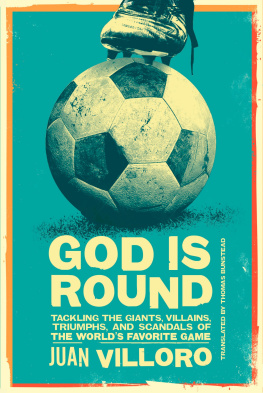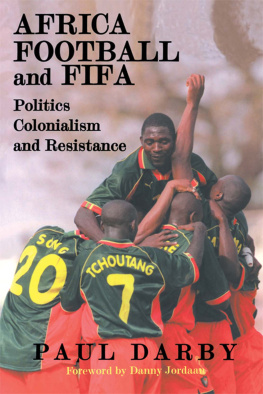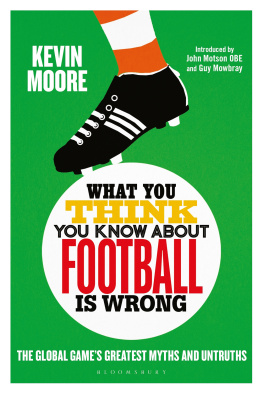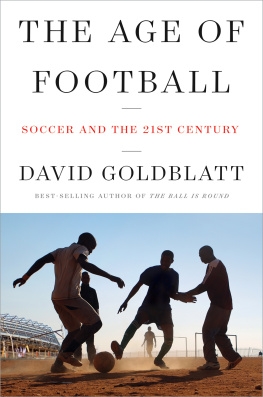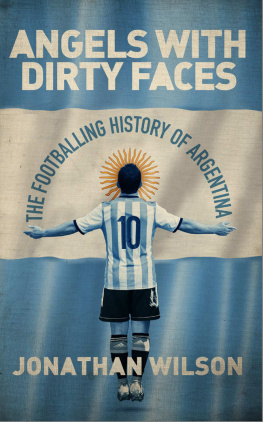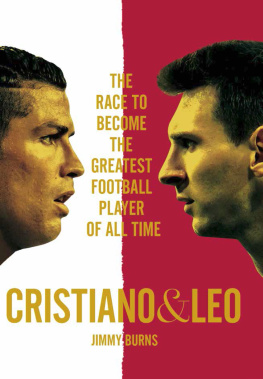In the beginning, God went to school and used to go and play football with his friends until classes started. Though God knows a lot, He always wants to learn and try new things. One day God said: Ive worked hard today, its time to go and play. God and his friend started playing football and at one point God kicked the ball so hard that it flew into a rosebush and burst. The explosion created the universe and everything around us.
This noise truly is an irritation, this match that seeps into my life once more when my only aim is to pay my dues and grow old with dignity. That is the aim of an Olympian, Goethian intellectual. And as I proceed to write, the beast of the terraces re-emerges, the militant Barcelona supporter, the fan of the club that, before it became a property developer, was more than a club.
Pythagoras used to say that life resembles the Olympic Games: a few people strain their muscles to carry off a prize; others bring trinkets to sell to the crowd for gain; and some there are, and not the worst, who seek no other profit than to look at the show and see how and why everything is done; spectators of the life of other people in order to judge and regulate their own.
Onetti the Ticket Vendor
In the days when literary types were heavy smokers, Juan Carlos Onetti reinvented the art of breathing. The Uruguayan writer had a smooth and firm lilt, which was necessary given the painful subject he always tackled: the truth. His conspiratorial, compassionate tone was a great softener. His characters embark on dead-end projects and senseless love affairs, struggling to impose a logic that only seems apparent to them. In the world of facts they always lose, but they maintain their dignity in pitting themselves against all evidence.
Curiously enough, this maker of supremely devastating fictions was at one time a seller of dreams. A letter dated July 10, 1937 included the following: No newsexcept for a job offer: Im going to be selling tickets at the national football stadium. It looks like I start on Sunday.
Hugo Verani brought the correspondence to light in 2009. The author of A Brief Life was writing to the Argentine painter and art critic Julio E. Payr, to whom he dedicated No Mans Land no less than twice (first inscribing his friends name and twenty-four years later adding with all my hate).
Onetti worked as a brick carrier, a painter-decorator, a porter, and a door-to-door salesman of calculators and drills before moving on to the demands of journalism (he was known to have slept at the newspaper offices at times). The strangest job he ever had was the one at the Estadio Centenario. In a magnificent irony, the job had been given to an inventor of defeats.
In Letters to a Young Writer, the novelist recommends the view of Montevideo from the stadium flagpole: Before me, the town; above me the proud, fluttering flag bearing the historic insignia, recalling the glorious afternoons of 40, 42, and 31, the glory among the howls, the hats, the bottles, and the oranges. (He alludes to results that include Uruguays 42 victory over Argentina in the 1930 World Cup Final.)
In the letters he writes of his absolute lack of faith. His furious skepticism drove him at one point to write, a cynical indifference is coming to fruition inside me. Football has been served by writers in a great many different ways (not excluding by some writers total ignorance of the game). In Onettis case, the job at the stadium provided him with an ironic emotional counterweight: I go to the stadium to form my own mass sensibility, multitudinous and at the same time unanimous. Nothing could have been more foreign to the author of The Shipyard than unanimity, but the pull of this enthusiastic temptation can be seen when we read him say hes going raja pal jurgo a very slangy, working-class way of saying off to the match.
The letters also reveal that he wrote a play in 1937 that was later lost: Napoleons Island . True to form, Onetti chose to write about the emperor after his downfall, when all he commanded was censure and rebukes.
What kind of football fan was Onetti? In another letter he says, A character in my boring book makes an apologia for a fantasy island to a downbeat woman. She listens, and then says: But thats all lies, isnt it? Downcast, he admits that shes right. The woman smiles. But it doesnt matter, she says. The islands a lovely place all the same. Dont you think? There are such things as necessary lies, soothing deceitfulnesssurely this was how Onetti saw football matches. Csar Luis Menotti was in agreement: A football stadium, he said, is the only place where I like to be deceived.
In his books, and in the Centenario, Onetti enters environments that are enhanced by what we believe about them, and he also showed that glory is, in the end, a modest cause, something that takes place among the howls, the hats, the bottles, and the oranges.
It would be an absurd sort of vanity to call oneself a disciple of Onetti; after all, theres only one master. All my reading has, however, led me to form a more minor delusion: I see him not as the manager who picked me to play, nor even as the star striker to whom I only need pass the ball. His legacy came to me in a simpler way, in keeping with the job he held for a short time: a ticket vendor.
I picture a sunny afternoon, him handing me my stub by the turnstiles, like a letter of safe passage that allows me to pass over the books and dive right into the stadium. And he does it with the most wonderful indifference, refusing to take responsibility for the consequences. Onettis books convinced me that the writing dream is a possibility.
This book combines a passion for literature and a passion for football. It would not exist if it werent for the on-pitch wizards, but just as crucial were the masters who convinced me of a certain axiom: reality gets better in the writing of it.
Among the howls, the hats, the bottles, and the oranges, the match gets underway.
Winter Champion: Fandom in the First Person
If there were to be a World Cup between football supporters, Mexico vs. Scotland would be a possible final. Neither country has ever done well on an international stage and, perhaps because of that, each has opted for the compensatory pleasure of filling stadiums instead.
Since I was a child Ive been aware that the matches I watch arent the best. The sensation of being far from truly great endeavors intensified when satellite TV began bringing goals to us from distant lands. But in any case, being a Mexico supporter, Ive always known that ones passion for the game has little to do with winning all the time.
When deciding which team to support you also decide the nature of your Sundays to come. Some will opt for a solid, familiar, popular side, while others, naturally enough, choose the most successful team at the time. Sometimes destiny takes the form of a regional fatalism, and before the person in question becomes conscious of their free will, the fan is born, Athens-like, determined by city.
Other times the choice is more random, like when the fan experiences love (of a player) at first sightsome bewitching idol who condenses all the hopes and dreams of youth. Nothing hurts like when a favorite player leaves for another club, having been such a focal point for the dreams of the supporters. But when it does happen, the fan will almost always stay faithful to the club, no matter how much of the initial motivation has left. The fan scans among the eleven ghosts now playing for the club, his or her attitude one of resignation as he or she tries to discern the magic of that first genius. At this point the game becomes merely a team game, no I in it until the apostate comes back to represent his new club, showing his face at the pitch where he was once a ninety-minute god. Then the people who used to worship at his feet taste something bitter in their mouths, the bitter saliva of discord, as they understand, with a great and lucid bitterness, that the one out there doing the heroics is not one of them, and perhaps never was.

